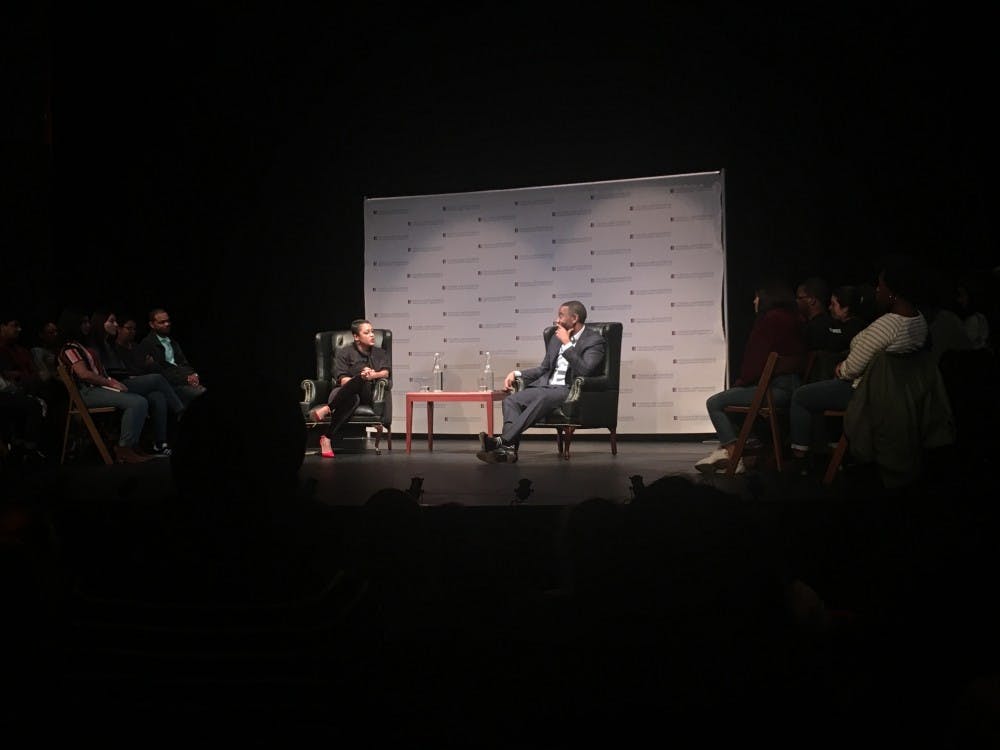Sociologist, poet and author Eve Ewing sat down with Ta-Nehisi Coates in the Greenberg Theater on Tuesday, Nov. 13 to engage in a conversation about Ewing’s new book, “Ghosts in the Schoolyard: Racism and School Closings on Chicago's South Side.” The evening was set up as an interview, during which Coates asked in-depth questions about Ewing’s work and her perspective on school systems across the country.
“It’s a real treat to be here with Eve Ewing,” Coates said to start the evening. “I was texting her earlier today, and I was like, ‘how much time do we have? Because I have so many f--king questions.’”
Ewing and Coates spoke first about public education in America and Chicago in particular, the main topic of “Ghosts in the Schoolyard.” They covered topics that spanned from individual experiences as a student and teacher, to the dysfunction of the education system as a whole and how its systemic racism and oppression take shape in school closings that heavily affect communities of color.
“This is a kind of symbolic gesture of violence that takes its place in the milieu of a larger pattern of devastation in black communities,” Ewing said. “The same communities that are heavily reliant on public school systems are also facing massive other forms of disinvestment and disenfranchisement.”
The two authors also spoke about the title and origins of Ewing’s book and how throughout her work with the public school system, Ewing has taken note of different forms of knowledge. When writing the book, she sought to do justice to the issues in Chicago that have been ignored for too long.
“Until now, it was not something you could necessarily read about in a book, but people knew,” Ewing said about the racist undertones of Chicago’s school closings. “What I wanted to do was to make it legible in this way and say, ‘yes, this really happened.’”
She spoke on how menial issues, like parking tickets or citations, can cause black people in Chicago to go bankrupt, but grassroots organizing and smaller scale data collection from locals allows people to gather information that is pertinent to solving these problems.
Towards the end of their conversation, the topic switched to Ewing’s work with Marvel. Coates explained how he has seen the impact that Ironheart, Ewing’s comic book character, has on people, not from the positive reactions, but from the negative ones. He has come to understand the nature of white supremacy in America through these never-ending criticisms.
“White supremacy is not in the business of coalition politics,” Coates said. “It’s not in the business in making a grievance. It’s not a compromise.”
The evening came to a close with a question and answer session with the audience. They answered questions about the Midwest’s school systems, public transportation, conversations about race, the “achievement gap” and how to decide who to hire in schools.
The night ended with a reading of a poem from Ewing’s debut book, “Electric Arches.” Coates cited his first reading of this poem as the point where he knew Ewing would be a great writer for Marvel. Ewing said her comic book writing serves a unique and central purpose.
“Superheroes are our shared culture and mythology about who is good, who is important, who is strong, who is brave, who do we look to in times of crisis,” Ewing said. “This is profoundly important. These are the stories we tell our children.”





